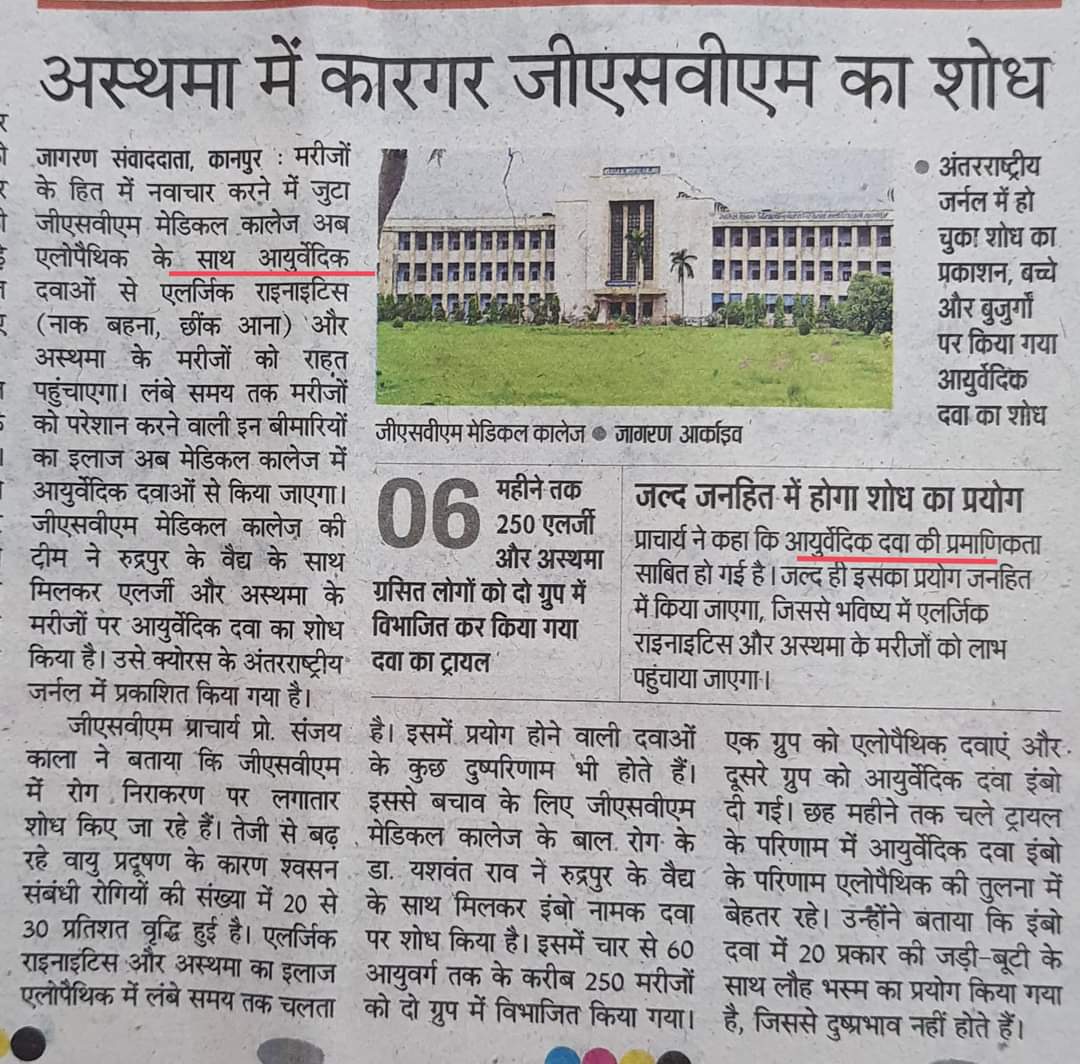
“Evidence is Knowledge and Knowledge is Evidence”
(सम्यग् ज्ञानम् प्रमाणम्)
Ayurveda’s Scientific Strides: Redefining Allergic Rhinitis
Posted by: Vaidya Balendu Prakash, 14 October, 2023
In India, Ayurveda, an ancient system of medicine, has historical significance in disease prevention and treatment. Despite its proven effectiveness and numerous miraculous cures, it remained inaccessible to many due to its mysterious aura. Recently, a classical Ayurvedic solution underwent rigorous scientific evaluation in a renowned Indian medical institute. The transformative results validated Ayurveda’s efficacy, bridging the gap between tradition and modern science.
Introduction:
Allergic rhinitis, a widespread health concern in India, casts a shadow over the lives of millions, manifesting in symptoms like sneezing, nasal congestion, itching, and rhinorrhea. While conventional treatments offer symptomatic relief, they often come with limitations and side effects, leaving a void that begs to be filled by a more holistic and natural approach. In response to this challenge, the ancient wisdom of Ayurveda has emerged as a beacon of hope, offering a gentle yet powerful solution: IMMBO.
In the bustling streets of India, allergic rhinitis is far more than a mere nuisance—it’s a significant health challenge affecting a substantial portion of the population. Sneezing fits, nasal congestion, and incessant itching disrupt the lives of millions, especially those in their prime years of productivity and social engagement. The impact of allergic rhinitis extends far beyond physical discomfort, seeping into the social fabric of individuals’ lives, impairing performance, disturbing sleep, affecting memory, and inflicting emotional distress.
Symptoms of Allergic Rhinitis:
Allergic rhinitis, commonly known as hay fever, is a prevalent allergic condition that occurs when your immune system reacts to airborne allergens. These allergens, such as pollen, dust mites, pet dander, or mold spores, trigger symptoms in the nose, throat, eyes, and sometimes the skin. The symptoms of allergic rhinitis include:
- Sneezing
- Stuffy or blocked nose.
- Itchy or Watery Eyes
- Discomfort in Throat and Ears
- Postnasal Drip
- Fatigue
- Difficulty breathing can result in fatigue and daytime sleepiness.
- Loss of Smell
- Dark Circles
- Irritability and Difficulty Concentrating
Estimates suggest that 20 to 30 percent of the Indian population suffers from allergic rhinitis, with a grim 15 percent progressing to more severe conditions like asthma and chronic obstructive pulmonary disease (COPD). This alarming trend not only poses a financial burden, estimated at a staggering 3.4 billion, but also demands a more comprehensive and sustainable approach to treatment.
Exploring Present Limitations in Allergic Rhinitis Treatment:
Contemporary treatments predominantly focus on symptom management rather than discussing the root cause of the issue. Antihistamines, nasal corticosteroids, and decongestants provide fleeting relief, easing nasal congestion and sneezing. Among these, the combination of levocetirizine and montelukast has been widely used, blocking histamine and inhibiting leukotrienes to mitigate allergic responses. Yet, these treatments, while offering temporary reprieve, are not without their set of drawbacks. Prolonged use of antihistamines can lead to side effects such as drowsiness, dry mouth, and mood changes. Intranasal corticosteroids, although effective, carry their own set of potential complications.
Amidst this medical landscape, Ayurveda, an ancient system of medicine originating in India, shines as a beacon of natural healing. Rooted in the profound wisdom of nature, Ayurveda offers holistic treatment strategies, emphasizing the use of natural ingredients. Ancient texts like Charak Samhita, dating back to 2000 BC, mention conditions resembling allergic rhinitis. Pratishyay, as described in Ayurvedic texts, mirrors the symptoms of sneezing and a runny nose, offering a historical context to the ailment.
Ayurvedic treatments focus on addressing the root causes of diseases, aligning perfectly with the growing need for more comprehensive and sustainable approaches to managing allergic rhinitis.
The Introduction of IMMBO:
The story of IMMBO’s discovery dates back to 1997. It all began when a clinic in North India unearthed the therapeutic potential of a herbo-mineral formulation. A groundbreaking clinical trial at the GSVM Medical College in Kanpur has sparked a glimmer of hope for allergy sufferers. IMMBO, a carefully crafted blend of eighteen herbs, including Turmeric (Curcuma longa), Amla (Emblica officinalis), and Long Pepper (Piper longum), along with Mandoor Bhasma, a unique form of iron ore, demonstrated unparalleled efficacy in relieving both acute and persistent allergic rhinitis symptoms. The synergy between these herbs and minerals forms the foundation of IMMBO’s potency.
A Glimpse into the Clinical Triumph of IMMBO:
To validate IMMBO’s potential, a rigorous clinical study was conducted. In this randomized, comparative study, 250 patients diagnosed with allergic rhinitis became the torchbearers of this revolutionary exploration. The study aimed to evaluate IMMBO’s efficacy against a conventional combination of levocetirizine and montelukast, spanning a 28-day treatment period.
The results of this groundbreaking study painted a promising picture. IMMBO not only significantly improved the Total Nasal Symptom Score (TNSS), a measure encompassing nasal congestion, sneezing, itching, and rhinorrhea, but also led to a statistically higher reduction in TNSS compared to the conventional treatment. This signifies IMMBO’s potential in offering more comprehensive symptom relief.
Equally noteworthy was IMMBO’s impact on Immunoglobulin E (IgE) levels. High IgE levels signify heightened sensitivity to allergens and more severe allergic reactions. IMMBO demonstrated a significant reduction in IgE levels, further indicating its ability to address the underlying allergic responses in the body.
While IMMBO’s success in the clinical arena is nothing short of groundbreaking, the journey doesn’t end here. Further research is imperative to unravel the intricate mechanisms of IMMBO’s action, solidify its safety profile, and explore its long-term effects on larger populations. The study underscores Ayurveda’s relevance in contemporary healthcare, presenting a natural alternative that doesn’t merely alleviate symptoms but holistically addresses the root causes of diseases.
The Path Forward:
In conclusion, the clinical study on IMMBO stands as a testament to Ayurveda’s profound wisdom, offering a ray of hope to individuals grappling with allergic rhinitis. As this ancient system of medicine continues to unlock nature’s healing secrets, it paves the way for a future where holistic healing, rooted in nature’s bounty, takes center stage. The journey from ancient texts to clinical trials showcases Ayurveda’s enduring legacy, offering not just a treatment but a promise—a promise of a healthier, allergy-free tomorrow, where the age-old wisdom of nature meets the precision of modern science.





Contact Padaav
Head Office
Prakash Villa, Near Rave Cinemas, NH-74, Danpur, Rudrapur, Uttarakhand - 263153
Branch Office: 2nd Floor ( Above KIA Showroom) 39, Mothorowala Rd, Bank Colony, Ajabpur Khurd, Dehradun, Uttarakhand 248121
Call Us
+91-9105490005
+91-9411147643
Email Us
padaav@gmail.com
